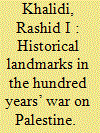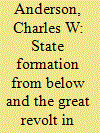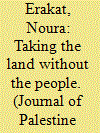|
|
|
Sort Order |
|
|
|
Items / Page
|
|
|
|
|
|
|
| Srl | Item |
| 1 |
ID:
155911


|
|
|
|
|
| Summary/Abstract |
In this reflection on the First Intifada (1987–93), Khalid Farraj recounts his very personal experience as an active member of the uprising. In addition to describing the harsh conditions in Israeli detention at the Ansar 3 prison in the southern Negev, Farraj details the ways in which the uprising was organized at the grassroots, fueling the hopes and dreams of an entire generation of Palestinians. He relates his own arrest in March 1988 during a security sweep of Jalazun refugee camp where he grew up and his work as an activist leafleting and disseminating information among the community. Farraj also provides a glimpse into the workings of the uprising both at the grassroots and at the level of the clandestine local leadership known as the Unified National Leadership of the Uprising (UNLU, al-qiyada al-muwwahida). Despite the letdown subsequent to the Oslo process, which yielded neither self-determination nor liberation for the Palestinians, the First Intifada remains a pivotal moment of Palestinian history, which Farraj looks back on with feeling but without nostalgia. This first-person text was translated from the Arabic by Nehad Khader and Maia Tabet. The original appeared in issue 110 (Spring 2017) of Majallat al-Dirasat al-Filastiniyya.
|
|
|
|
|
|
|
|
|
|
|
|
|
|
|
|
| 2 |
ID:
155906


|
|
|
|
|
| Summary/Abstract |
This essay argues that what has been going on in Palestine for a century has been mischaracterized. Advancing a different perspective, it illuminates the history of the last hundred years as the Palestinians have experienced it. In doing so, it explores key historical documents, including the Balfour Declaration, Article 22 of the Covenant of the League of Nations, and UN Security Council Resolution 242, none of which included the Palestinians in key decisions impacting their lives and very survival. What amounts to a hundred years of war against the Palestinians, the essay contends, should be seen in comparative perspective as one of the last major colonial conflicts of the modern era, with the United States and Europe serving as the metropole, and their extension, Israel, operating as a semi-independent settler colony. An important feature of this long war has been the Palestinians’ continuing resistance, against heavy odds, to colonial subjugation. Stigmatizing such resistance as “terrorism” has successfully occluded the real history of the past hundred years in Palestine.
|
|
|
|
|
|
|
|
|
|
|
|
|
|
|
|
| 3 |
ID:
155912


|
|
|
|
|
| Summary/Abstract |
This essay looks at the hearing held by the Foreign Affairs Committee of the U.S. House of Representatives in April 1922 on the subject of a Jewish National Home in Palestine, as well as the broader congressional debate over the Balfour Declaration at that crucial time. The landmark hearing, which took place against the backdrop of growing unrest in Palestine and just prior to the League of Nations’ formal approval of Britain’s Mandate over Palestine, offers a glimpse into the cultural and political mindset underpinning U.S. support for the Zionist project at the time as well as the ways in which the political discourse in the United States has, or has not, changed since then. Despite the overwhelming support for the Zionist project in Congress, which unanimously endorsed Balfour in September 1922, the hearing examined all aspects of the issue and included a remarkably diverse array of viewpoints, including both anti-Zionist Jewish and Palestinian Arab voices.
|
|
|
|
|
|
|
|
|
|
|
|
|
|
|
|
| 4 |
ID:
155910


|
|
|
|
|
| Summary/Abstract |
Thinking about events and dates that Palestinians commemorate, one hundred years after the fateful Balfour Declaration of 1917, reveals a political timeline on which the story of contemporary Palestinian history hangs. Commemoration, as an act, tends to lionize certain events and persons, especially when it is officially created or sponsored. Because Palestinians have long been without an official political entity in Palestine that can produce official commemorative actions, Palestinian commemorations reflect both individual and collective actions that develop and change over time. This essay analyzes those actions and the different spaces and actors behind them to explicate the politics of commemoration. It posits that the metanarratives of Palestinian history that have developed give primacy to the powers and forces that undermined Palestinian aspirations and actions. As metanarratives, they create frames for understanding history within a political and national discourse of struggle, dispossession, and suffering. And yet, these metanarratives miss the embodied practices of commemoration that define Palestinian life within this struggle. Detailing Palestinians’ commemorations reveals the robust culture that ties commemorations of the past with activism, awareness, and education for the present and the future.
|
|
|
|
|
|
|
|
|
|
|
|
|
|
|
|
| 5 |
ID:
155909


|
|
|
|
|
| Summary/Abstract |
This paper reexamines the Palestinian struggle for self-determination and the extent to which a viable two-state solution to the Israeli-Palestinian conflict was ever truly possible. Such a reexamination seems all the more pertinent today on the hundredth anniversary of the Balfour Declaration. It is also seventy years since the UN partition plan to divide historic Palestine and fifty years since UN Security Council Resolution 242, which has been the basis for every peace agreement between Israel and its neighbors but makes no mention of or reference to the Palestinian people. The paper argues that the history of the past fifty years reinforces the claim that a State is central to any attempt to fight Palestinian erasure and ensure “the right to have rights,” as Hannah Arendt put it, but it argues that such an entity needs to be elevated above the nation, rather than made subservient to it if it is to protect the rights of Palestinians and all those living on the land of Palestine.
|
|
|
|
|
|
|
|
|
|
|
|
|
|
|
|
| 6 |
ID:
155908


|
|
|
|
|
| Summary/Abstract |
The Great Revolt (1936–39) represented the most fervent and sustained Palestinian challenge to British and Zionist colonialisms during the thirty years of British rule in Palestine. Although its ultimate defeat has led to negative appraisals of its historical significance, the uprising was in its day the largest mass mobilization in Palestinian history and, at its apex, threatened to overturn the British regime. The rebellion was characterized by considerable organizational ingenuity as Palestinians created novel institutions that embodied their drive for popular sovereignty and an end to colonial domination. This article principally examines two such sets of institutions, the national and popular committees of 1936, and the rebel court system from 1937–39. In doing so, it argues that much like revolutionary peasant-based movements elsewhere in the colonial world, insurgent forces in Palestine embarked on a process of state formation from below. This process aimed to sap the colonial regime of its authority and weaken its capacities while augmenting those of the rebels by integrating broad segments of the population into insurgent frameworks. It further contends that it is the dynamic of state formation from below, and the popular character and leadership of the rebel movement, that lent the revolt its resilience and enabled it to push the colonial state to the wall.
|
|
|
|
|
|
|
|
|
|
|
|
|
|
|
|
| 7 |
ID:
155907


|
|
|
|
|
| Summary/Abstract |
This paper seeks to show how Israel has deployed Occupation Law in strategic ways to incrementally take the land of Palestine without its people. It argues that Israel has used UN Security Council Resolution 242 to retroactively legitimate those colonial takings in a political framework shaped by U.S. intervention. In themselves, the constituent pieces of the argument are not new and they have been extensively discussed in legal, political science, and historical literature. Rather than consider them as the sum of their parts, this paper attempts to view the issues that have been kept distinct and separate within disciplinary silos as a mutually-reinforcing whole, demonstrating that the United States’ political position made an otherwise bankrupt legal argument effective and showing how the Security Council’s deliberations gave Israel ample room for maneuver in spite of the drafting parties’ original intent. In examining the relationship between law and political power, the article points to the ways in which the balance of power bears upon the meaning and significance of law in international conflict. Thus, the failure of Occupation Law to regulate the occupation of the Palestinian Territories ultimately reflects the outcome of a political, not a legal, contest: Israel’s legal argumentation that the territories are merely under its administration would have no value were it not for the power politics that shape international relations in the region.
|
|
|
|
|
|
|
|
|
|
|
|
|
|
|
|
|
|
|
|
|